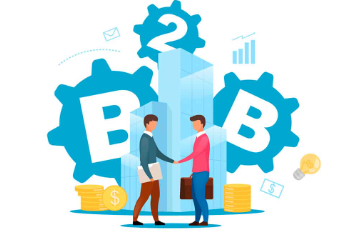What Is B2B Communication and How It Is Used
Business-to-business transactions, also known as B2B transactions, are transactions conducted between businesses, such as by manufacturers and wholesalers or by wholesalers and retailers. In business-to-business, companies transact business with one another rather than with individual consumers. Businesses-to-business transactions are different from businesses-to-consumers and businesses-to-government.
B2B and B2C are alike and different at the same time. B2B, of course, focuses mainly on communication between companies, whereas B2C targets consumers directly.
Business-to-business sales differ greatly from consumer sales in that the services and products are often tailored to the specific needs of the customer. This results in a long-term sales process and communication that emphasizes problem-solving, added value, and relationships.
In this article, we will take a look at what B2B is, how it is used in iGaming as well as some other examples of B2B.
Understanding Business-to-Business
It is common for companies to transact business-to-business in their supply chains, as they purchase components and raw materials for manufacturing. Individuals can then purchase finished products via business-to-consumer transactions.
Business-to-business communication refers to communicating between employees of different companies through social media, for example. A B2B communication is one where the employees of two or more companies communicate with each other.
B2B in iGaming
Many B2B iGaming firms develop and provide software for iGaming operators who then sell it to other iGaming firms. With the development of Casino B2B providers over the past two decades, many known brands supply the leading operators of the iGaming industry with world-class software.
Some of these B2B providers also offer B2C services. If an operator wants to choose the right iGaming software provider (also called an iGaming platform provider), several factors need to be considered. While operators have their choices to make, players also must make theirs. With the number of games developed daily and the number of providers available, it can be hard to navigate the world of iGaming, and that is where sites like CasinoArabie.com come into play since they offer guides on the best online casinos and help the customers make the right choice.
A few of the most successful B2B providers are active in the iGaming industry, whether it is casino software suppliers or game developers, with new products appearing daily. To maximize revenue and protect players, these providers ensure that iGaming operators receive top-notch casino software.
Business-to-Business (B2B) Examples
Manufacturing companies frequently conduct business with other businesses and deal with large corporate accounts. As an example, Samsung is Apple’s largest supplier of iPhone components. Among Apple’s B2B relationships are Intel, Panasonic, and semiconductor manufacturer Micron Technology.
The automobile industry also relies heavily on B2B transactions. It is common for automobile manufacturers to purchase parts manufactured independently and assemble automobiles using them. Different companies typically manufacture tires, batteries, electronics, hoses, and door locks and sell them directly to automotive manufacturers.
It is also common for service providers to engage in B2B transactions. For example, companies that specialize in property management, housekeeping, and industrial cleanup mostly sell their services to businesses rather than to individuals.
Special Considerations
The success of a business-to-business transaction depends on planning. The establishment of business-client relationships depends on the account management staff of a company. For business-to-business transactions to succeed, relationships must also be nurtured, typically through professional interactions before sales are completed.
Additionally, traditional marketing practices help businesses connect with their clients. A trade publication, which offers businesses printed and online advertising opportunities, assists in this effort. The presence of a business at conferences and trade shows also creates awareness of the products and services that it offers.
Although B2B clients differ significantly from B2C clients in many ways, the same marketing and communications principles apply to both, since both need to communicate with other people. When you understand the key differences between the two, you can prepare and tailor your communication strategy to help both you and your client reach your business goals – and then exceed them.

